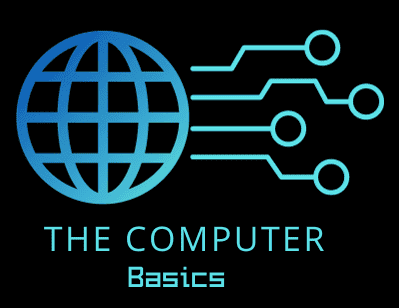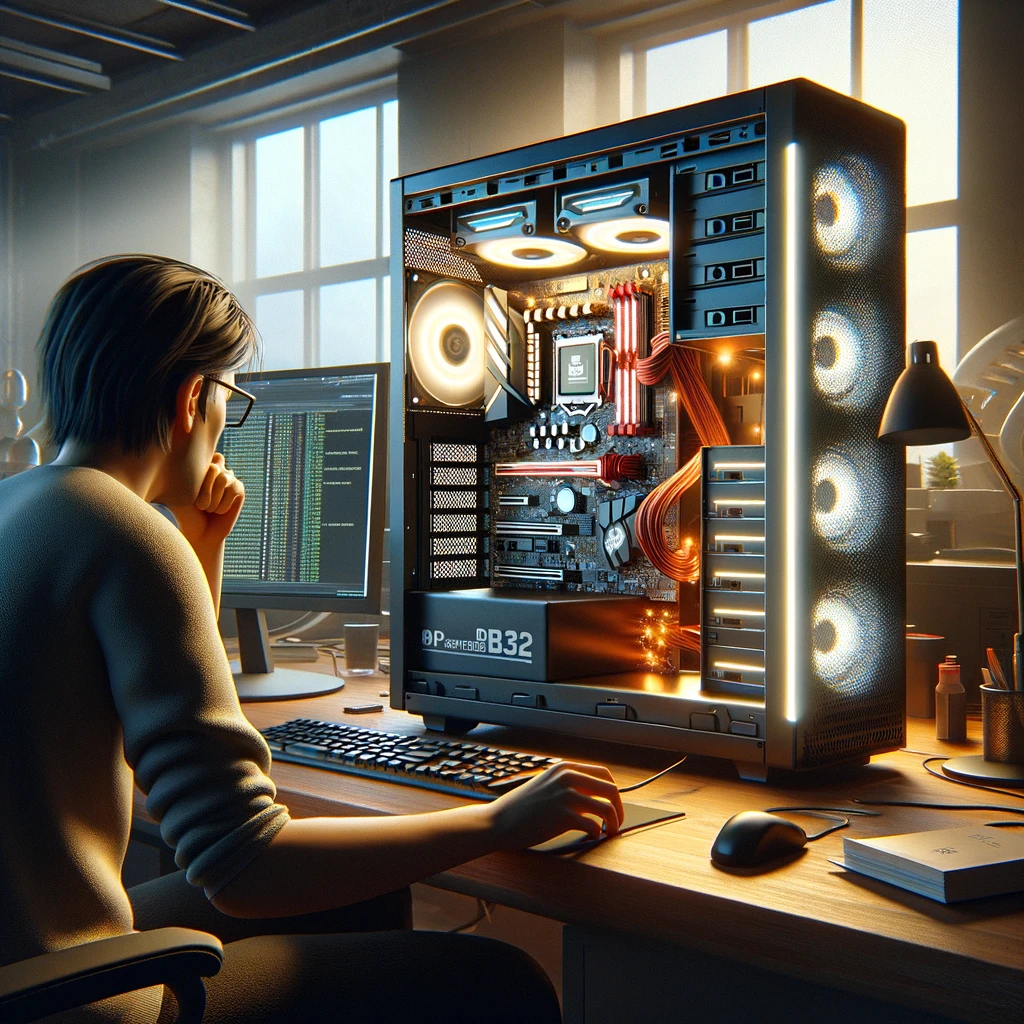So, you’ve just played tech wizard and pieced together your brand-new PC. You hit the power button and voilà—lights on, fans whirring… and then it’s lights out. Talk about a short-lived victory dance, right?
There you are, standing in the glow of your screen, now dark as your suddenly cynical soul, wondering if your motherboard has a flair for dramatic exits.

Before you start considering a motherboard exorcism, consider this: the irritating on-off loop you’re witnessing is not uncommon. It’s like your PC is trying to say, “Guess what I can do,” before promptly running out of stage confidence and diving behind the curtain.
But what’s causing this indecisive behavior—could it be that one of your shiny new components isn’t playing nice, or maybe it’s the motherboard itself just being fussy?
Fear not, your computer’s not turning into a tech tease on purpose. Your motherboard, that big circuit board that plays host to all the other pieces of hardware, has its reasons for being a power diva.
Solve the mystery, and you might just get your PC to stay powered on long enough to show off its full potential. Maybe it’s just shy, or maybe it’s auditioning for a role in a device drama, but either way, let’s figure out what’s up with your electrically charged drama queen.
Decoding the On-Off Mystery

Your pristine new motherboard treated you to a light show blinked a cheery hello, and then ghosted you faster than a bad date. Let’s roll up our sleeves and get to the bottom of this high-tech tease.
Evaluating Power Supply Shenanigans
First off, check your power supply unit (PSU). It’s the silent guardian of your precious motherboard (MB), and if it’s throwing a tantrum, you’ll have a front-row seat to an unwanted reboot theater.
Ensure all power cables are seated with the confidence of a cat on a fresh pile of laundry.
If the cables are tight and your PSU is still acting like a moody teenager, you might have a faulty power supply on your hands.
- Flip the switch: Your PSU has a little voltage switch that only a select few ever notice. It’s the small red slider that lives in a world of ‘110’ and ‘220’. If it’s not set right, it’s like giving your MB a cheeseburger but no bun – totally unacceptable and a bit messy.
The Case of the Flip-Flopping Motherboard
Next up is your MB, an innocent bystander or the culprit of the caper? If your motherboard was a detective, it’d wear a trench coat and look skeptical about whether it was getting the right input voltage.
Motherboards need the right juice, and if they get a sip of something funky, they’ll just up and leave — power off.
- Cable Interrogation: Interrogate every cable like they’re your suspects in a game of Clue. Was it the SATA cable in the library with the candlestick? Or maybe the 24-pin connector that looks like it might be hiding something? Get those cables to confess their part in this mystery.
Your motherboard and PSU are in a relationship; it’s complicated. Make sure they’re speaking the same electric love language, or the on-off saga continues.
Sleuthing the CPU and RAM Conundrum
When your computer starts acting like a moody teenager, flipping on and off, you know there’s a mystery afoot. Time to don your tech detective hat and get down to the nitty-gritty of the CPU and RAM caper.
Processor Interrogation
First up, let’s shine a light on the brain of your operation, the CPU.
If you just updated your PC’s noggin with a new processor, you’re going to want to make sure this smarty-pants is compatible with its motherboard counterpart.
Sometimes, the motherboard’s BIOS needs an update to work with the latest genius chip on the block. Imagine trying to have a deep conversation with your grandpa about the latest meme. Yeah, you’ll need to bridge that generational gap.
- Compatibility: Make sure the motherboard and CPU are the Jamie and Cersei of the PC world – perfectly matched, minus the drama.
- BIOS Update: If they ain’t chit-chatting, a BIOS update might just be the Rosetta Stone you need.
RAM Stick Lineup
Next, let’s interrogate the lineup of suspects: your RAM sticks.
These little sticks of memory can cause a big kerfuffle if not installed properly, or if one is playing the double agent and is actually defective.
- Installation Check: Ensure they’re seated in the correct slots and not just loitering around. Motherboards can be finicky about which slots they prefer — kind of like how you can’t just sit anywhere at a fancy dinner party.
- Trial & Error: Test each RAM stick individually — a game of musical chairs to see who’s causing the trouble. The rebel without a cause could be messing with the whole system.
Motherboard’s Secrets Unveiled
Your motherboard may seem like a stoic piece of technology, but it has more secrets than a reality TV show. Let’s dive into the clandestine world of beeps, bios, and bursting capacitors, and find out why your MB might be acting like it’s on a soap opera finale.
Bios & Beeps: Cracking the Codes
When your computer acts like it’s trying Morse code, those beeps are your motherboard’s cry for help. Unlike your ex, the MB actually tells you what’s wrong – if you speak its language.
Beep codes vary by manufacturer, but here’s the scoop:
- 1 short beep: Life is good, your computer should be thanking the heavens.
- Continuous beep pattern: RAM isn’t feeling too well.
- Repeating short beeps: Your motherboard is having power supply issues.
- One long and one short beep: The motherboard is crying about a motherboard issue or bad CMOS.
Beep codes usually point toward issues that can prevent booting. Your BIOS is the megaphone through which your motherboard communicates these codes. It’s like a diagnostic fortune cookie, minus the cookie.
Capacitor Whodunit
Let’s play a game of Clue on your motherboard. Spoiler: It’s usually Colonel Capacitor in the Circuit Board with the Overheating.
Capacitors, like tiny techy canisters of electricity, can cause drama if they become defective or, as the technical term goes, they go kaput. Here are some signs dotted on your motherboard:
- Bulging or Leaking Capacitors: They are about to throw in the towel.
- Burnt Smell: Your motherboard’s olfactory SOS signal.
- Computer Randomly Shutting Off or Not Turning On: It’s not your PC being moody, it’s a yell for help!
Some reasons for capacitor misdemeanors include overheating (may need better thermal compound), power surges (get that protector already), or just plain old age (ain’t no fountain of youth for electronics).
Peripheral Drama: A Hardware Whirlwind

You’ve been on the edge of your seat, haven’t you? Your new motherboard’s power antics have turned your computing experience into a roller coaster ride. But fear not! We’re about to unravel the mystery behind those irritating on-and-off stunts that your beloved PC has been pulling.
GPU Gossip and PCIe Plot Twists
Your GPU has been chattering away in the PCIe slot, spreading rumors that it’s not getting enough power.
Could it be that the power button is playing a foul game, causing jitters in the circuitry? Check if the beastly graphics card is properly seated in its throne – a loose connection here could be the culprit behind the motherboard’s theatrical performance.
Hard Drive Hard Talks
Then there’s the hard drive, whispering sweet nothings to the memory slots. Apparently, they’re feeling a bit left out from the power supply’s affections.
A hardware problem between these components might just become an episode worth watching. Are all the cables and connectors snug and secure? Double-check—the answer might just lie within a simple game of ‘connect the hardware dots’.
The Great Escape to the Computer Repair Shop

So, you’ve finally decided to flee the confines of your home office, bravely venturing out with your beleaguered rig in tow. It’s time for a comedic crusade to the computer repair shop. The thought alone is enough to send shivers down your spine—or maybe that’s just static from too much tinkering with the internals.
Upon arrival, you approach the counter, armed with nothing but your wit and a hope that the repair doesn’t cost an arm and a leg (or a GPU). Here’s what you might expect:
-
Rousing Round of Troubleshooting: Your computer acts like it’s on a power trip, turning on and off like it’s the king of suspense. While you could throw guesses all day, it’s best to leave it to the pros and their troubleshooting prowess. They’ll decipher those cryptic blinks of your power LEDs like Morse code experts.
-
Quest for Replacement Parts: Lost in a labyrinth of screws, motherboard standoffs, and parts-that-shall-not-be-named, you watch as they perform the arcane arts to resurrect your machine. Hint: If they mutter something about summoning an AMD chipset or PCIe screws, it’s totally normal. No need to panic.
Let’s break it down:
| Hardware Heroes | Tools of the Trade |
|---|---|
| Skilled Technician | PH0 Screwdriver |
| Deductive Reasoning | Anti-static Wristband |
| Mystic Manual | The Almighty Multimeter |
Whether your fans twirl gracefully like ice skaters or refuse to perform, the tech gurus will offer not only their support but also a good chuckle or two to lighten the mood. After all, watching your computer’s lights flicker can feel a bit like a failed audition for “Windows 10: The Musical.
Every escape to the repair shop is a tale of its own—think of it as a side quest where you might just emerge with a mightier motherboard, ready to take on the digital world once more.
Just make sure to praise the computer gods for faithful tech support because those lights and fans aren’t going to fix themselves!
Frequently Asked Questions

Sometimes, your computer acts up right after you’ve installed a new motherboard, turning on and off in a seemingly endless cycle. This quirky behavior might leave you puzzled, but these FAQs will help you understand what’s behind the mysterious power dance.
Why is my computer playing peekaboo with its power button?
Your computer might be stuck in a boot loop, a common issue when there’s a power or hardware connection problem. Check for common causes and fixes like a faulty power button or an improperly seated component.
Did my PC join a gym because it’s doing on-off reps?
No, your PC hasn’t taken up a new workout routine. Instead, it might be suffering from compatibility issues with the new motherboard.
Ensure that the motherboard is meant to run with your CPU, otherwise, it’s like skipping leg day – a big no-no for proper performance.
Is my computer trying to blink Morse code at me with its start-up?
While it’s not actually sending you an SOS, the on-off pattern could be signaling an electrical short or a failing power supply. Make sure all cables are properly connected and no foreign objects are causing shorts on the motherboard.
Does my PC think it’s a yo-yo, going on and off like that?
It’d be pretty cool if your PC picked up yo-yo tricks, but unfortunately, it’s likely a symptom of an issue with your motherboard installation. Recheck your work and make sure everything is installed correctly and firmly.
Why does my desktop think it’s a light switch, flicking on and off?
Your desktop might have an identity crisis—it thinks it’s a light switch. But really, you might want to make sure you’ve installed new drivers after swapping out the motherboard, as outdated or missing drivers can cause instability.
What’s causing my gaming rig to play ‘Dead or Alive’ with its power cycle?
Gaming rigs can be drama queens sometimes. Yours might just need you to check the power supply.
Make sure it’s delivering enough juice to all components. This is especially important if you’ve upgraded to a more power-hungry setup.

